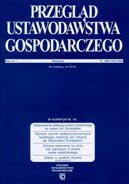Przegląd Ustawodawstwa Gospodarczego Nr 03/2010
Miejsce wydania: 2010 Warszawa
Oprawa: miękka
W numerze:
Marcin Stoczkiewicz
Przedsiębiorstwo energetyczne jako przedsiębiorstwo świadczące usługi w ogólnym interesie gospodarczym a pomoc państwa (część II)
The Energy Company as an undertaking which renders Services of General Economic Interest and State aid (part two)
The subject matter of the second part of this article is the practical consequences of the possibility of using the exemption set out in Article 106 (2) of the FEU Treaty for energy companies which render Services of General Economic Interest. These consequences would be significant. If it were determined in a specific case that services of general economic interest entrusted to a given energy company were subject to Article 106 (2) of the FEU Treaty, this would mean that, to a certain extent, the energy company could be exempted from the application of Article 107 (1) of the FEU Treaty (the general ban of State aid). Since aid to these undertakings could be awarded to a larger extent and (in principle) without the European Commission being notified, it could awarded more quickly than under the regime set out by the general provisions on State aid. This is of major significance in the context of large investment needs in the energy sector, serving to ensure the security (including diversification of supplies) and environmental protection (including the mitigation of climate change), which require public intervention. This paper analyses the possibility of using Article 106 (2) of the FEU Treaty in the case of aid awarded to energy companies and the practice of EU institutions in this field.
Grzegorz Materna
Status uczelni publicznych i niepublicznych w sprawach abstrakcyjnej kontroli postanowień wzorców umownych
Status of public and private universities in the matters of abstractive control of pattern contracts
Contractual terms which has not been individually negotiated, when found by the Court of Competition and Consumer Protection unlawful and entered in the Register of Prohibited Clauses, are not binding to the consumers. These provisions apply to contracts concluded with consumers by professional providers of goods and suppliers of services. It makes the status of contractor to the consumer the matter of great practical importance. The article constitutes an analysis of status of private and public universities under the provisions prohibiting unfair terms in consumer contracts. While according to the jurisdiction it is undisputable that terms of standard contracts concluded with students by private universities fall within the scope of the legal provisions mentioned above, the status of public universities is not certain. The article presents the arguments that both private and public universities are addressees of these legal provisions, while providing educational services for the remuneration. While carrying out the mission of educating students, they act as professional suppliers of services to consumers. Both private and public universities participate in professional business transactions when they provide educational activities for the remuneration and conclude contracts with students. Moreover, while differences between schools of different (private or public) legal status is weakening, they appear to each other as competitors providing substitutable services.
Anna Kobus
Windykacja pomocy publicznej przyznanej niezgodnie z zasadami wspólnego rynku w świetle prawa wspólnotowego
Recovery of unlawful State aid - the European perspective
The article describes the European rules concerning the recovery of unlawful State aid, in particular aid granted in breach of Article 88 (3) EC. It covers the principles under which the Commission should order recovery of State aid. They are defined in the Regulation No. 659/1999 and Regulation No. 794/2004 and derive originally from the case law developed by the ECJ and the CFI within almost 40 years. Once the recovery has been ordered by the Commission in a decision (so called negative Commission decision), the Member State which granted the aid is obliged to enforce it. The European requirements of enforcement of negative Commission decisions are the second aim of the article. According to the Regulation No. 659/1999 recovery has to be effected without delay, in accordance with the procedures under the national law of the Member State concerned and provided that they allow the immediate and effective execution of the Commission's decision. In order to achieve recovery, Member States are obliged to take all necessary steps which are available in their respective legal systems, including provisional measures, without prejudice to Community law. These high requirements are very often disobeyed by the Member States and an issue of actions before the ECJ and CFI.
Joanna Błeszyńska-Wysocka
Glosa do wyroku Sądu Apelacyjnego w Warszawie z dnia 19 czerwca 2008 r. (syg. akt CSK 22/08)
| Kurier Inpost | 14 zł |
| Kurier FedEX | 14 zł |
| Inpost Paczkomaty | 14 zł |
| Odbiór osobisty | 0 zł |
| Darmowa dostawa | od 250 zł |
| Darmowa dostawa w Klubie Książki | od 200 zł |

